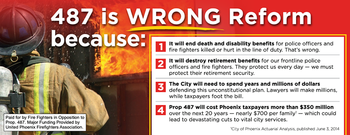City of Phoenix Initiative to Amend Pension Plan, Proposition 487 (November 2014)
| Voting on Local Pensions |
|---|
| Local Ballot Measures |
| By state |
| By year |
| Hotspots Reports |
| Most recent edition |
| Original Case study |
| San Jose & San Diego |
| State-wide Measures |
A citizen initiative designed to amend the city pension plan, Proposition 487 (originally called Proposition 401), was on the ballot for Phoenix voters in Maricopa County, Arizona, on November 4, 2014. It was defeated.[1]
Election results
| Phoenix Proposition 487 | ||||
|---|---|---|---|---|
| Result | Votes | Percentage | ||
| 152,735 | 58% | |||
| Yes | 110,614 | 42% | ||
Election results via: Maricopa County Elections Office website
Initiative design
The group Citizens for Pension Reform designed the initiative with the following primary goals:[2]
- To change the city's retirement system from a defined benefit system, in which retirees are guaranteed payments despite investment performance, to a 401(k)-style defined contribution plan, in which the city contributes a set amount, and the retiree's benefits depend on his or her own contributions and investment performance.
- To implement procedures to stop pension spiking by implementing limits on the pension benefits available to current employees.
Text of measure
Ballot summary
The ballot summary was approved by the Phoenix City Council to appear on the ballot for Proposition 487:[3]
| “ |
Amend City Charter: Eliminate participation in the current retirement plan and establish a defined contribution plan for new employees; allow current employees to transfer into this plan; prohibit City contributions to any other retirement plan, including deferred compensation plans, post-employment benefit plans and the police officer and firefighter retirement system. A "YES" vote shall have the effect of amending the City Charter to change retirement plan terms for City employees as state above. A "NO" vote shall have the effect of retaining the existing Charter provisions governing City employee retirement plans.[5] |
” |
Ballot title
The ballot title of the initiative appeared as follows:[6]
| “ |
An initiative measure amending the Phoenix City Charter Chapter XXIV, relating to employee retirement system plans, by adding Part V and adopting The Phoenix Pension Reform Act of 2014; Preventing pension spiking; Providing a retirement plan for future hires; Protecting certain rights of current employees in the city of Phoenix Employees' Retirement System; Providing for future termination of City of Phoenix Employees' Retirement System when it has no more participants or liabilities.[5] |
” |
Full text
The full text of the ordinance proposed by this initiative is available here.
Support
Supporters
The following groups and individuals supported Proposition 487:
- Citizens for Pension Reform[7]
- Council member Sal DiCiccio, District 6[8]
- The Arizona Free Enterprise Club (AFEC)[9]
- Vice Mayor Jim Waring, District 2[8]
Arguments in favor
Council member Sal DiCiccio made the following statements in favor of Proposition 487:[8][10]
- "If you want to create a model for business growth, you must create an environment of stability. Businesses and jobs will begin to follow those cities, regions and states demonstrating financial stability. Imagine the message we send to the nation if we successfully tackle our long-term financial obligations. Imagine the message we send to Washington, D.C., if we solve our long-term debt. And, imagine the message we send to job creators that our fiscal house is in order."
- "I am a strong supporter of pension reform, and you should be, too. Facts: 50 Phoenix retirees will be getting $183 million by the time they are 75. A librarian took $280,000 in cash at retirement, and then started a pension of $102,000 per year. This creates strain on public safety, senior services and libraries. The initiative is not perfect, but it does two things: First, it ends all forms of pension spiking. Second, it moves new employees to a 401(k) retirement system, just like yours. Pension reform saves taxpayers millions, stops the abuse and creates more predictability in budgeting."
Vice Mayor Jim Waring, who represented District 2 in northeast Phoenix on the city council, said:[8]
- "I support the pension-reform initiative. It will end pension spiking. It will save the city millions in the long run. It will fundamentally change a broken and prohibitively expensive system. Real reform is desperately needed. The March 2013 ballot issue may save taxpayers up to $600 million, but no real reforms were enacted and the financially ruinous status quo persists. In this case, voters will have the chance to make real reforms. If we don't act, rising pension costs will continue to cause budget deficits and reductions in public safety."
Opposition
Opponents
The following groups and individuals opposed Proposition 487:
- City Pension Reform Task Force[11]
- Council member Kate Gallego, District 8[8]
- Council member Laura Pastor, District 4[8]
- Council member Michael Nowakowski, District 7[8]
- Mayor Greg Stanton[8]
A PAC called Fire Fighters Opposed to Prop. 487 was created to oppose the initiative.[12]
Arguments against
Mayor Greg Stanton made the following statement in opposition to Proposition 487:[8]
- "Since taking office, I've championed major pension reform to save $830 million and move Phoenix in the right direction. This initiative, though, isn't reform — it's reckless: it places a heavier burden on taxpayers in the near future, reduces pay for all city employees (including police officers and firefighters), and puts basic city services at risk. According to an independent, third-party actuary, the initiative won't save money, but would instead cost taxpayers up to $651 million over the next 20 years — and that doesn't include the millions the city will be forced to pay to trial lawyers to defend it in court."
Council member Kate Gallego made the following statement in opposition to Proposition 487:[8]
- "Pension reform should save money, and this ballot initiative will not. It is full of legal inconsistencies and will be tied up in court for years. The ballot initiative will add new costs, estimated at $477 million over 20 years, while doing nothing to address our current $1.5 billion in liabilities. I represent a district that needs investments in our roads, parks and public safety. We cannot afford this poorly written initiative."
Council member Michael Nowakowski made the following statement in opposition to Proposition 487:[8]
- "I agree that pension reform is necessary, however, this initiative will be subject to legal challenges that increases liability to the city, places risk on employees and reduces retirement benefits. Most important, this initiative will make our city less attractive to current and future employees when compared to other public employers. We have already had three separate committees work to find solutions, but instead put us at a disadvantage with the Rule of 87. I could not support another initiative that negatively affects our competitiveness. Our employees and city need real reform that is fair and has long term stability."
Council member Laura Pastor made the following statement in opposition to Proposition 487:[8]
- "The fact is, the costs associated with this initiative are still unknown, and I am extremely concerned about the unintended consequences that would impact Phoenix taxpayers and city employees. If new employees stop contributing to the current system, as this initiative requires, the city will have to continue to fulfill our pension commitments to retirees, now and in the future. The voters and the City Council supported pension reform in 2013 with projected cost savings of nearly $600 million over 25 years. I would like to give that initiative time to make an impact before we change the system again. For now, the council should focus on supporting public safety, community programs, strategic planning and reforming our budget process instead of a misguided attempt that could potentially gut our entire city budget."
Fire Fighters Opposed to Prop. 487 posted a photo of a fireman's daughter on its Facebook page, saying:[12]
- "If Prop. 487 passes and the unthinkable were to happen to her dad at work, Claire and her mom would receive nothing. Taking line-of-duty death benefits from firefighters and police officers is simply wrong."
Dustin Gardiner wrote the following in The Arizona Republic:[12]
- "City officials agree Prop. 487 could impact disability and death benefits. Because new employees could not enroll in a pension system, they wouldn't have access to the disability and survivorship programs it offers. And attorneys for the city have said that could extend to current and new police officers and firefighters. Although the initiative includes a preamble stating it's not intended to impact first responders, the city has said the actual language is poorly written and could have the opposite effect, though the issue would likely have to be resolved in court."
Reports and analyses
City actuarial report
Cheiron, the city's actuary, conducted a study on Proposition 487 that showed the initiative costing the city between $358 million and $600 million over twenty years, rather than saving money. The study focused on the closure of the city's current pension system for new hires, leaving the city to pay retirement benefits for past employees without contributions into the system from new employees, who would be a part of the new 401(k)-style pension system. The study claimed that this would accelerate the repayment of the city's unfunded pension liabilities. After Vice Mayor Jim Waring and Councilman Sal DiCiccio objected to the scope of the actuarial report and requested a report that looked at additional aspects of Proposition 487, actuaries found that Proposition 487 would save taxpayers as much as $500 million over two decades.[13][14][15]
The analysis provided to Phoenix City Council included the following component:
| “ |
In the information presented to Council at the June 10, 2014 meeting, the actuarial consultant, Cheiron, estimated additional costs of $390 million from the Initiative. Because of additional data provided to Cheiron, the equivalent estimate of the costs of the Initiative is now $358 million, excluding those changes which are considered open legal questions.[5] |
” |
| —Cheiron, the city's actuary[16] | ||
The full actuarial report is available here.
Background
City pension funding
In a 2009 study, the Pew Charitable Trust estimated that the Phoenix public employee retirement system had $5.115 billion in liabilities and that $1.399 billion of this fund was not backed by city assets, making the retirement fund only 73 percent funded. The city of Phoenix 2013 Actuarial Value Report showed that the unfunded liabilities of the city's pension system equaled $1.5 billion, with the pension fund having dropped to 56 percent funding. The annual supplementary pension payments of the city rose by 40 percent from 2011 to 2013, resulting in a 2013 payment of $253 million. In 2003, the pension payment was $35 million.[17][7][18][19][20][21]
Propositions 201 and 202, March 2013
Propositions 201 and 202 were referred to the March 2013 ballot on October 31, 2012, through a unanimous (9-0) vote of the Phoenix City Council. The council proposed the measures in response to the rising cost of the city's retirement plan, which cost taxpayers $28 million in 2000 while it cost $110 million in the 2012 fiscal year and $283 million in 2013. The provisions in both propositions were introduced through the recommendations of the Pension Reform Task Force, including a continuation of the city's Defined Benefit Program, a 50/50 contribution split between the employees and the city, and an increase in retirement age. [10][22][2][11]
Pension spiking
Pension spiking is a practice in which city employees convert certain benefits, such as unused sick time or saved vacation pay, to boost the salaries on which their pensions are based or to extend their credited length of city service. A report in The Arizona Republic featured 10 public-safety retirees that had increased their lump-sum retirement benefits to over $700,000 and their annual pension payouts to more than $114,000 per year through spiking. The Arizona Republic also estimated that spiking cost city taxpayers $12 million per year, when counting the use of overtime and premium pay to boost pensions. City officials denied the study because they claimed overtime and premium pay were part of base salaries, not perks, and should not be counted as spiking.[18][23]
On October 31, 2013, the Phoenix City Council voted 5-4 to approve new spiking regulations developed by the city's Pension Fairness and Spiking Elimination Subcommittee. The regulations prohibited applying cellphone allowances, car allowances, or lump-sum payments for sick and vacation leave to pension salaries. Under the plan, employees could still use pre-existing sick and vacation leave balances toward increasing their pensions.[18][24]
Path to the ballot
Citizens for Pension Reform needed to collect 25,480 valid voter signatures before March 14, 2014, to place the initiative on the ballot in 2014. On March 11, 2014, the group turned in over 54,000 signatures, which was more than double the required threshold.[25][26]
On April 25, 2014, the Phoenix city clerk certified over 33,000 signatures, qualifying the initiative for the November ballot.[27] Because Proposition 487 sought to amend the city charter, the city council did not have authority to directly approve the initiative.[1]
The initiative process in Phoenix:
The signature requirement percentages for valid petitions, as established by state law, are based on the number of voters in the last mayoral election. For petitions to be valid, they must contain valid signatures equal to 15 percent of the votes cast in the last municipal mayoral election. Petitions must be filed within two years from the date on which the official proposition number is assigned, and signatures obtained more than 6 months prior to the date of filing shall be invalid and certified so by the clerk (Phoenix Charter, Chap. XV). After the city clerk has certified that the petition for an initiative ordinance is valid and sufficient, the Council must either:
- Pass the initiative unaltered within 20 days of petition certification. For initiatives seeking to amend the city charter, however, the council cannot pass the initiative themselves but must submit it to the city voters.
- Within 25 days, either call a special election less than 120 days after the council's decision on the initiative or resolve to place the ordinance on the next regular city election if that election is less than 6 months after the council's decision on the petition. Petitions to amend the Charter cannot simply be adopted by the council, but must be submitted to a decision of the electors.
Related measures
Similar measures
See also
External links
- Phoenix City Government website, "elections information" (dead link)
- Phoenix Pension Reform Act website
Additional reading
- AZCentral.com, "Pension spiking may cost Phoenix $12 mil per year," October 17, 2013
- Casa Grande Dispatch, "Editorial: Phoenix pensions," October 24 2013
- AzCentral.com, "Phoenix takes modest steps to fix pension ‘spiking’ rules," November 1, 2013
- Ahwutukee Foothills News, "DiCiccio, proponent of pension system overhaul, prefers voters have final say," March 18, 2014
- AZ Central, "Phoenix pension-reform initiative is not a sham," March 25, 2014
- The Arizona Republic, "Phoenix officials accused of showing bias on pension initiative," October 6, 2014
Footnotes
- ↑ 1.0 1.1 Phoenix Pension Reform Act website, "Phoenix Pension Reform Act to be on November Ballot," April 28, 2014
- ↑ 2.0 2.1 Azcentral.com, "Phoenix ballot initiative would overhaul pension system," September 16, 2013
- ↑ Phoenix City Clerk website, "Ordinance S-41041, Ballot language for Proposition 487 (401)," archived July 16, 2014
- ↑ Note: The proposition was originally titled Proposition 401 and appeared on the official ballot as Proposition 487
- ↑ 5.0 5.1 5.2 Note: This text is quoted verbatim from the original source. Any inconsistencies are attributable to the original source.
- ↑ Maricopa County Libertarian Party, "Phoenix Pension Reform Act text," accessed January 30, 2014
- ↑ 7.0 7.1 Phoenix Pension Reform Act website," accessed February 27, 2014
- ↑ 8.00 8.01 8.02 8.03 8.04 8.05 8.06 8.07 8.08 8.09 8.10 8.11 Arizona Republic, "Most on Phoenix council oppose pension-reform act," June 20, 2014, archived July 18, 2014
- ↑ Cite error: Invalid
<ref>tag; no text was provided for refs namedFEC - ↑ 10.0 10.1 Cite error: Invalid
<ref>tag; no text was provided for refs namedDiCiccio1 - ↑ 11.0 11.1 Cite error: Invalid
<ref>tag; no text was provided for refs namedTFDOC - ↑ 12.0 12.1 12.2 AZ Central, "Opponents say Phoenix pension reform ends death benefits for police, fire," September 11, 2014
- ↑ Morrison Institute for Public Policy, "Citizens’ Initiative Review of Proposition 487: Pension reform," accessed September 26, 2014
- ↑ The Arizona Republic, "Pension 'reform' would cost taxpayers $358 million," July 16, 2014
- ↑ Cite error: Invalid
<ref>tag; no text was provided for refs namedReason - ↑ Phoenix.gov, "City Council Report on Prop. 487," archived September 12, 2014
- ↑ Pew Charitable Trusts, "Cities Squeezed by Pension and Retiree Healthcare Shortfalls," March 2013
- ↑ 18.0 18.1 18.2 Azcentral.com, "Phoenix pension ‘spiking’ rules vary for city employees," September 14, 2013
- ↑ Pew Charitable Trust, "A Widening gap in Cities," January 2013
- ↑ Arizona Free Enterprise, "Stop Pension Abuse," accessed January 30, 2014
- ↑ AZ Central, "Phoenix voters may see pension-reform plan on ballot," June 11, 2014
- ↑ Phoenix Pension Reform FAQ
- ↑ AZCentral.com, "Pension spiking may cost Phoenix $12 mil per year," October 17, 2013
- ↑ AzCentral.com, "Phoenix takes modest steps to fix pension ‘spiking’ rules," November 1, 2013
- ↑ Ballotpedia Staff Writer Josh Altic interview with Paul Jacob, January 22, 2014
- ↑ Cite error: Invalid
<ref>tag; no text was provided for refs namedsignatures - ↑ Ballotpedia, "Laws governing local ballot measures in Arizona," accessed March 12, 2014
| |||||||||||||








